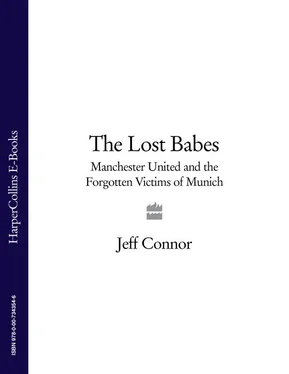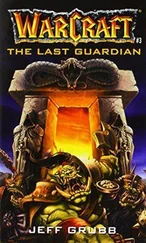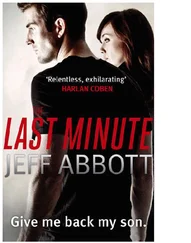Monday was traditionally wash day, using a tub and mangle—the Servis twin tub, labour saver of a million housewives of the future, was still beyond the family budget of most—and as the family did not possess a refrigerator it meant a daily trip to the shops for a full-time housewife like Liz Colman.
In the manner of Salford, the Colmans’ household was cheerfully matriarchal. Dad handed over his pay packet on a Friday night and mum put on one side money for the rent man, electricity and Christmas Club and then tipped him his beer and cigarette money. Eddie would be granted his sixpence a week pocket money. He was educated at Ordsall Council School, where lessons were written out in pencil in longhand atop ancient wooden desks and where a clapper bell summoned children from a dank asphalt yard to lessons. The school can boast three very distinguished old boys in the footballer and, in a later era, Allan Clarke and Graham Nash of the Hollies, one of several Manchester groups who vainly tried to emulate the fame and status of the Beatles in the Sixties. Nash, later to become even more celebrated as the twee songwriter and singer in the supergroup Crosby, Stills and Nash is still remembered in Ordsall for his performance as an Ugly Sister in the school’s version of Cinderella .
This, then, was the background and environment which shaped the personae of one of the most dazzling and beguiling of the Busby Babes. Colman’s style of play in the school team matched his character and that of the street urchins of Salford: cheeky, extrovert and yet generous (he was to score only two goals in the whole of his United career). He also went in first wicket down for Salford and Lancashire Boys’ Cricket team and it would be true to say, as with most of the Busby Babes and young sportsmen of that era, that sport provided an outlet and opportunity that upbringing did not.
Colman’s path to Old Trafford followed lines that were to be mirrored in every one of his United contemporaries: kickabouts in the street and impromptu matches on ‘red recs’—levelled rubble among the bombsites—that scarred young knees. Then schools football, lads’ football, followed finally by a tap on the door from the United scout.
He was the original local boy, in every sense of the words. Archie Street was within walking distance of Old Trafford, half a mile away, and the young player’s route to work took him up Trafford Road and over the swing bridge across the Ship Canal at Wharf Way. Often he was late, and Jimmy Murphy soon became immune to Eddie’s standard excuse that the bridge, which straddled the main Manchester and Pomona Docks, had been raised for a passing ship just as he arrived. Murphy, trying his best to look and sound exasperated, would castigate the little wing-half. But always with a smile, for he adored little Eddie.
Eddie’s gifts were obvious to Busby and Murphy from the start…the famous body swerve that earned him the nickname of Snakehips, the adroit drag-back, the push and run into space and the startling speed off the mark for a boy described by the Northern Ireland goalkeeper Harry Gregg, who joined the club from Doncaster Rovers in December 1957 as ‘a wee wag with a beer belly’. And all done with an infectious joie de vivre , like a cheeky fifthformer playing truant from school, that captured so many hearts at Old Trafford.
Duncan Edwards, his muscular partner in the middle of the park, was both bigger and more famous then and now, but Colman struck a chord in the hearts of the United support that lasts to this day. He was one of them.
The Colman wiggle could be as disconcerting and baffling to team-mates. ‘I remember the first time I played with Eddie and even now it’s hard to believe this happened,’ adds Gregg. ‘I was in goal and Eddie at wing-half and I was a wanderer. If the ball went forward twenty yards, I went forwards twenty yards if it came back twenty I came back twenty. Eddie got the ball and he does this, a wiggle, and I found myself doing the same thing.’
Despite his stature, he was not a soft touch. The fledgling footballer’s boyhood hero was Ronnie Allen, the West Bromwich Albion forward who, at 5 ft 9 in, was not only the smallest centre-forward ever to play for England but one of the few English players Eddie could look straight in the eye. In an early encounter at The Hawthorns, Allen fouled him in the clumsy manner of all forwards and Colman, who had learned never to turn the other cheek as a teenager in Ordsall, went after his illustrious opponent. As the two bantamweights squared up, it was United’s captain Roger Byrne who stepped in as a mediator, leading the irate wing-half back to his own half.
The fans’ love affair with a boy who was to make only eighty-five first-team league appearances had begun long before his first-team debut, aged nineteen, in November 1955. As part of three winning FA Youth Cup sides, one of them as captain, Colman’s skills had already become part of pub and terrace folklore before he lined up against United’s old bêtes noires Bolton at Burnden Park in 1955 for a match in which he was to make an indelible mark and astonish even seasoned campaigners including the opposing captain, Nat Lofthouse. United lost 3-1, but a new star was born and Colman’s influence on the side that won the Championship in consecutive seasons, 1955-56 and 1956-57, was immense, with his wickedly incisive passing and devastating dribbling. Busby and Murphy, wisely, made no attempt to stifle the occasional eccentricities. Nothing, it seemed, could prevent the boy from Salford from making an indelible impression on the game.
If his predecessors at Old Trafford like Carey, Chilton and Rowley had seen their careers and lives disrupted by calls to the armed services, Colman, like every other youngster in Britain between the ages of eighteen and twenty-five, found potential disruption in the National Service, that curse of youth in the Fifties. Originally set at eighteen months, the term of conscription was lengthened to two years in 1950—much to the dismay of the reluctant conscripts—at about the same time as United’s younger players were peering ahead at what they hoped would be great football careers. Instead, the dreaded medical, the ten weeks of basic training, the parade ground, psychopathic sergeant majors and the delights of spit ‘n’ polish beckoned. Worse, with the outbreak of the Korean War in that year, the unrest in Malaysia and Kenya and the EOKA terrorism campaign in Cyprus, there was a real fear that they could finish up shooting at enemy soldiers rather than the opposition goal.
The reality, however, was gratifyingly different for any servicemen of even average sporting ability and most of them never set foot outside these shores in uniform. Ronnie Cope, who joined the club from junior football in 1951 and could claim to have been one of the original Busby Babes, was called up in 1953 and expected to be posted abroad, possibly to the army of occupation in Germany.
Cope says: ‘I was on my way when an officer came along and pulled me and seven other footballers out of the ranks to start up a football team in the unit. I would play in the Army team during the week, then go home at weekends to represent United. The Army actually got permission from United for me to play. I was paid £1 a week by the Army and the same from United as a retainer plus a match fee. I was never paid the £7 a week of the contract but the club did reimburse the train fare for going back north—if we could provide a receipt.’
Colman, who served in the Royal Signals at Catterick, was also recognized by a senior officer at once, spirited away from the other ranks, and given the duty of physical training instructor combined with an ill-defined role as the camp rat-catcher. Both sinecures gave him ample time, not only to head out to the local pub with his Signals mate Peter Swan for a few beers, but to carry on playing football throughout his two years in uniform.
Читать дальше












